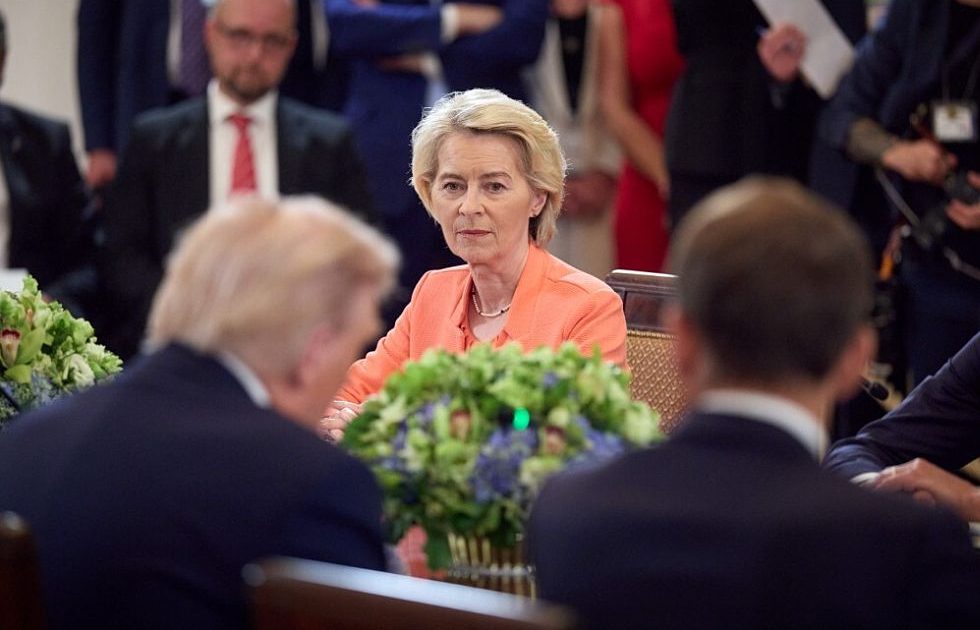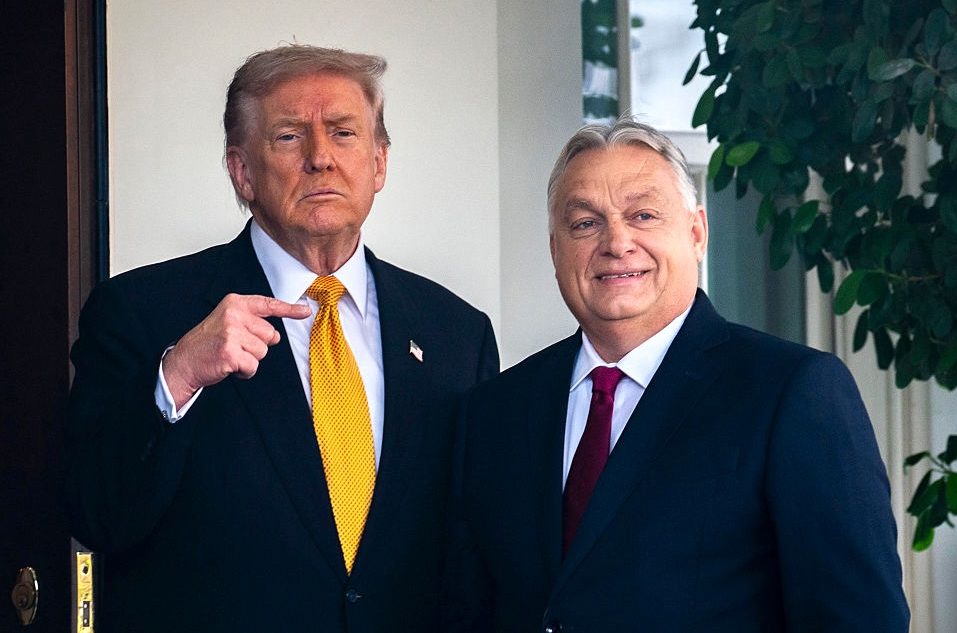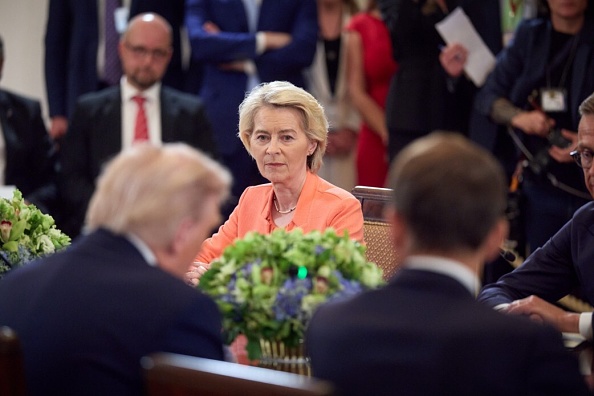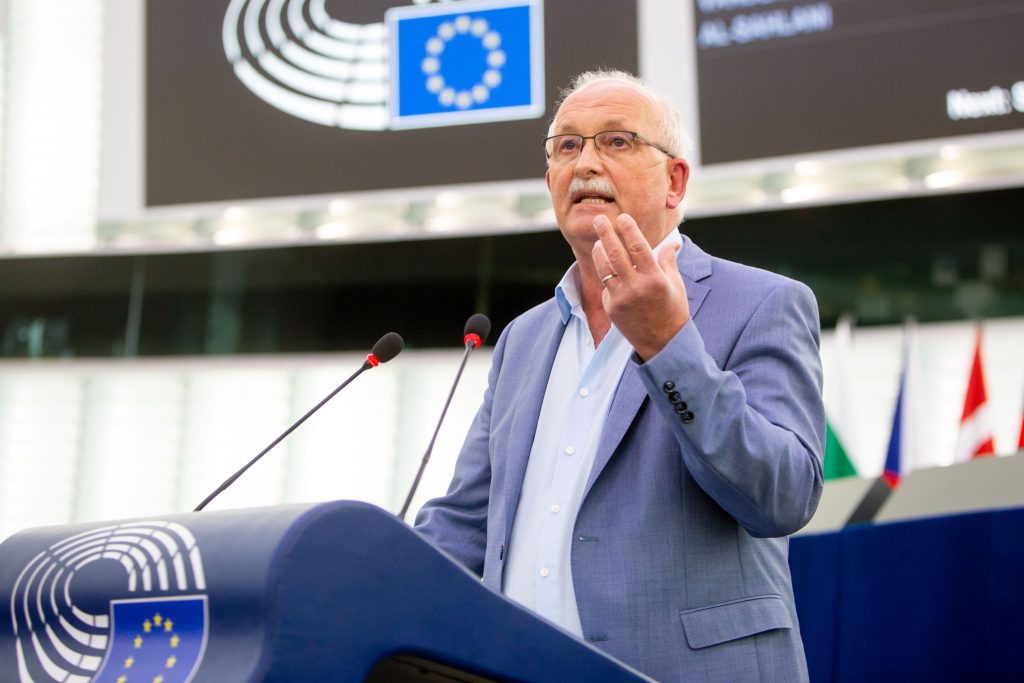Inside the EU's private assessment on Trump's massive aid cuts
The US cuts will leave funding gaps for fragile countries in the areas of rule of law, human rights, security and migration. But with the EU also cutting aid, it now needs 'a strong narrative' abroad, officials say

Donald Trump’s deep cuts to US foreign aid open the door for the EU to wield greater influence abroad – but risk undermining health programs and fuelling a resurgence of ISIS in Syria, according to a confidential working paper, circulated among EU national officials before the summer and since obtained by Euractiv.
When the Trump administration gutted foreign aid programmes earlier this year, the EU’s official line was that the bloc “cannot fill the gap left by others”. Behind the scenes, however, officials from the European Commission and the EU’s External Action Service were arguing that there were steps the bloc could take, provided these served European interests and values.
The US withdrawal of $14 billion in global humanitarian funding – or 41% of the total – has put into question the “survival of the multilateral humanitarian system”, the paper notes.
In Afghanistan, for instance, “the withdrawal of US aid is poised to have profound effects on the country’s socio-economic stability”, according to the paper, adding that “health and nutrition remain particularly exposed”.
But the paper cautioned that “any decisions to fill some gaps in US funding will be taken in areas that safeguard EU interests (such as migration, security, and stability) and uphold EU values.”
Continued US withdrawal from Afghanistan, the paper contends, is likely to result in the EU becoming one of the largest bilateral donors to the country, “enhancing its strategic influence over funding modalities and priorities”.
That is not the only region of the world where the EU sees opportunity in Trump’s retreat.
When it comes to forced displacement, including in Africa, the paper argues that now is the time to “rethink the camp/settlement model, which has become overly reliant on international funding”. To this end, “The EU and its Member States should collaborate with UNHCR and host countries to promote freedom of movement in key regions (e.g. Horn of Africa), inclusion in national systems and urban responses to displacement.”
The Commission did not respond to Euractiv’s request for comment for this story.
Asked what actions flowed from the EU institutions’ analysis, a diplomat from one EU member state, speaking on condition of anonymity, told Euractiv: “We produced papers, discussed it a lot, found something else to talk about.”
The void left by Trump
The working paper conveys the scale of the impact from Trump’s move to dismantle the US Agency for International Development (USAID).
In Syria, the document warns that “without sustained international support, the management and security of the camps holding Islamic State of Iraq and Syria (ISIS) detainees and their families will be affected, with the risk of a resurgence of ISIS”.
For crises in Sudan and Yemen, the paper notes that USAID funded, through UNICEF, about 80-100% of the pipeline for Ready to Use Therapeutic Food, a basic calorie-rich foodstuff used to alleviate malnutrition. “If procurement is not continued and stockpiles run out, about 20% of children with severe wasting are likely to die in the absence of treatment,” the paper notes.
On health, the EU is “being pressured by international partners” to help fill gaps in the response to the mpox virus, and malaria mortality rates are predicted to spike – an “increase of 15 million additional cases and 700,000 deaths is estimated, predominantly among children and young women”.
On climate, the EU services write: “There is … a risk that climate finance is diverted/halted away from clean tech and renewable energy sources towards fossil fuel extraction and that key stakeholders (financial institutions and investors) globally don’t see it as an attractive area for investment anymore.”
The paper also puts forward unvarnished assessments of the Trump administration’s motives. For example, Commission officials estimated that the US was unlikely to quit the UN’s Food and Agriculture Organization due to “strong US agro-industrial interests”.
Ways and means
Brussels has taken some concrete steps in response to the US cuts, shifting and frontloading some resources, and tapping its annual aid reserve under the bloc’s 2021-2027 budget for unforeseen emergencies.
Commission President Ursula von der Leyen recently announced a Global Health Resilience Initiative to combat “disinformation that threatens global progress on everything from measles to polio” (though ironically, the statement included no accompanying information).
But even if the EU wanted to fill the gaps left by the US, European aid agencies are hamstrung by their own shrinking budgets. Heavyweights like Germany, France, the Netherlands, Belgium and the Commission itself have all announced steep cuts to aid spending in recent years.
The working paper acknowledges the problem, and suggests the answer to less money is better PR.
“Since some of Member States are considering or announcing significant cuts to their aid budgets,” the paper notes, “a strong EU narrative needs to be developed and deployed, using concrete examples of effective support and climate action (including under Global Gateway).”
Global Gateway is the Commission’s latest branding of its aid budget, which it is increasingly deploying to “derisk” private investment – ideally by European firms – around the world.
The Commission used last year’s mid-term budget review, together with instructions from EU leaders to cut €2 billion in development spending, to drastically reduce country-specific allocations to almost all nations that receive EU aid.
Much of the funding was instead pooled in regional investment envelopes, designed to guarantee EU development banks against losses when investing in more advanced markets.
The Commission’s humanitarian aid department fought the move, arguing that cuts to countries like the Central African Republic (-73%), Togo (-48%) and Malawi (-45%) violated the EU executive’s own regulation, which obliges the Commission to prioritise countries “most in need”.
But those arguments were overruled by von der Leyen’s office last year and the changes went through.
As a result, while the latest analysis by EU services acknowledges that the US cuts will leave funding gaps for fragile countries in the areas of rule of law, human rights, security and migration, it adds that due to the Commission’s own cuts, “the EU will in general not be in a position to fill the gaps”.
(bts, jp, 0w)









